The Partners Advisory Board (PAB) has been established to provide regular guidance and advice to the Department of Global Health leadership and broader department community in the cultivation of more equitable, respectful, and ethical collaborations with institutional and organizational partners around the world and the U.S.
DGH Partners Advisory Board Members:
Rahel Behailu, Brama Kone, Abebe Bekele, Magaly Blas, Peter Cherutich, Rosa Marlene Manjate Cuco, Fatima Hassan, and Biraj Man Karmacharya.
Rahel Behailu, MPH, PAB Chair
Program Executive / Health Equity of YMCA of Greater Seattle
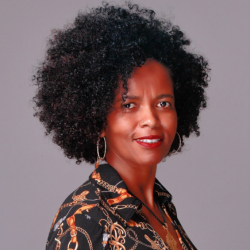
Rahel brings over 12+ years of dedicated service extensive expertise as a health equity subject matter expert, specializing in equitable strategies, community health engagement, advocacy, analytics, bias reduction, and diversity equity and inclusion practices.
Throughout her tenure at the YMCA of Greater Seattle, she has spearheaded numerous health equity initiatives, from conception to evaluation, aimed at addressing systemic disparities and fostering inclusive environments. Passionate about improving outcomes and reducing unconscious bias, she is committed to collaborating with diverse, vulnerable, and underrepresented populations to achieve tangible impacts in health equity.
In addition to her role as Program Executive of Health Equity, she's held leadership positions such as Co-Chair of the Health Council for the Ethiopian Community in Seattle and Health & Wellness Director at the Meredith Mathews YMCA.
Her contributions extend beyond the organizational realm, encompassing impactful research and publications on barriers to preventive healthcare access among African-born individuals and the effects of HIV-related stigmas on testing behaviors within immigrant communities.
Moreover, her involvement in advisory councils, professional memberships, and community boards underscores her dedication to advancing health equity on multiple fronts, bridging academic research with practical, community-oriented solutions.
Dr. Brama Kone, PhD, Eng., PAB Co-Chair
Associate Professor in Sanitary Engineering and Environmental Epidemiology of the African and Malagasy Council for Higher Education (CAMES)
Regional Advisor for Climate Change and Health Africa Regional Office, World Health Organization
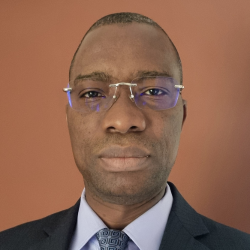
Dr. Brama Kone is an Associate Professor in Sanitary Engineering and Environmental Epidemiology of the African and Malagasy Council for Higher Education (CAMES). Since 2021, he is regional advisor for Climate Change and Health at the Africa regional office of the World Health Organization (WHO-AFRO). Before joining WHO-AFRO, Dr. Kone was a lecturer and researcher at the university Peleforo Gon Coulibaly in Côte d’Ivoire and researcher, project leader at the Swiss Centre for Scientific Research in Côte d'Ivoire for almost 20 years.
From 2013 to 2021 he was adjunct lecturer of public health and disaster risk management at the university of Lomé (Togo) in the frame of the West African Science Service Centre on Climate Change and Adapted Land Use (WASCAL).
Dr. Kone’s research interests include health risk associated with Water, Sanitation and Hygiene (WaSH) as well as climate change adaptation. He authored and co-authored some forty peer reviewed papers and book chapters and led west Africa regional research projects on climate change and health since 2009. Dr Kone served as a member of the International Association for Ecology and Health; of the International Society for Environmental Epidemiology and of the Future Earth Health Knowledge Action Network (Health KAN).
Professor Abebe Bekele, MD, FCS (ECSA), FACS, FRCSEd, MAMSE
Dean of the School of Medicine, Professor of Surgery, University of Global Health Equity
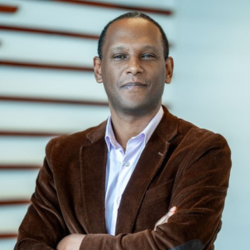
Abebe Bekele, MD, FCS (ECSA), FACS, FRCSEd, MAMSE, is Dean of the School of Medicine at the University of Global Health Equity (UGHE) in Rwanda. He has served as CEO of the Black Lion Teaching Hospital and Dean of the School of Medicine of Addis Ababa University in Ethiopia. He is a Professor of Surgery (General and Thoracic surgery) at UGHE, Addis Ababa University and University of Rwanda, and is an Adjunct Professor the Duke Global Health Institute. He has received fellowships in Medical Education from FAIMER in Philadelphia and in Simulation Based Education from the University of Washington. He has also graduated in Surgical Leadership from the Harvard Medical School. He has vast experience in medical and surgical education for more than 32 years and is a fellow of the Ethiopian Academy of Sciences and the Academy of Master Surgical Educators of the American College of Surgeons.
Professor Abebe is the Secretary General of the College of Surgeons of East Central and Southern Africa (COSECSA) and served as Chairman of the Examinations and Credentials Committee for the past 7 years, He is the and Editor-in Chief of the East and Central Africa Journal of Surgery and sits on the editorial board of the JAMA health forum and the Ethiopian Medical Journal. He has published more than 125 articles and book chapters and is a recipient of several regional and international awards including the CUGH distinguished Leadership award in 2024. He serves as a member of the advisory councils and boards of the Ethiopian Ministry of Sciences and Higher Education, the WHO council on Learning and Capacity Building in Health Emergences, the Global Surgery foundation and the African Forum for Research and Education in Health
Professor Abebe is actively engaged in Global Safe Surgery and has served as a senior advisor to the Federal Ministry of Health, Ethiopia in the Saving Lives Through Safe Surgery initiative. He is passionate about equitable access to surgical care, care, gender equity in global surgery and surgical education. His research interest include trauma, surgical oncology, equity in global surgery and education.
Dr. Magaly Blas, MD, MPH, PhD
Professor and Researcher, School of Public Health and Administration at Universidad Peruana Cayetano Heredia (UPCH)

Dr. Magaly Blas is a professor and researcher at the School of Public Health and Administration at Universidad Peruana Cayetano Heredia (UPCH). She leads the Intercultural Citizenship and Indigenous Health Unit and the Mamás del Río Program. Recently, she was appointed to lead the political advocacy secretariat in medicine and health at the Peruvian Medical College.
Dr. Blas graduated as a medical doctor from UPCH and holds a master's and doctorate in Public Health, specializing in epidemiology from the University of Washington (UW). She has also completed two diplomas in HIV and Sexually Transmitted Infections and Medical Informatics at the same institution.
Since 2016, Dr. Blas has received multiple awards, including the international Elsevier Foundation award for women researchers, the L'Oreal-UNESCO-Concytec award for Peruvian scientists, the Women in Innovation award from UPCH, as well as the Eisenhower and Fulbright scholarships. Under her leadership, the Mamás del Río Program received the Good Practices in Public Management award from Citizens Today in 2016 and the Recognition for Social Innovation in Health by the Pan American Health Organization in 2019. In 2023, Forbes magazine nominated Dr. Blas as one of Peru's 50 most influential women.
Dr. Peter Cherutich, MBChB, MPH, PhD
Senior Deputy Director of Medical Services, Kenya Ministry of Health (MOH) | Clinical Assistant Professor in Global Health, University of Washington

Dr. Peter Cherutich, MBChB, MPH, PhD is a Senior Deputy Director of Medical Services at the Kenya Ministry of Health (MOH) and a Clinical Assistant Professor in Global Health at the University of Washington. He is the former Head of the Department of Preventive and Promotive Health with the Kenya Ministry of Health. Prior to that, he was Head of HIV Prevention at Kenya’s National AIDS and Sexually Transmitted Infections Control Program (NASCOP). His most notable contribution to HIV prevention was the scaling up of Kenya’s male circumcision HIV prevention services to become one of the largest program in Africa.
He has chaired many technical working groups on HIV prevention and, notably, was the team lead for the development of Kenya’s HIV prevention revolution roadmap. He obtained his PhD in Implementation Science in the Department of Global Health at the University of Washington. His PhD dissertation, published in The Lancet HIV, provided additional evidence for the adoption of HIV partner notification services by the World Health Organization. His current research interests include exploring the feasibility of partner notification in key populations and developing effective prevention and care interventions for hepatitis C infection among people who inject drugs.
Dr. Rosa Marlene Manjate Cuco MD, MPH
Health Counsellor, Mozambique Mission in Geneva World Health Organization

Dr. Rosa Marlene Cuco is a Medical Doctor, with a MSc. in Public Health from University of Washington (Seattle, USA). She has dedicated more than 35 years to the health sector and currently serves as the Health Counsellor at Mozambique Mission in Geneva, Switzerland.
Prior to this role, Rosa worked as a medical doctor and public health leader at Mozambique’s Ministry of Health, where she was instrumental in addressing one of the most severe HIV epidemics in the world and she also was the Coordinator of COVID19 National Response. Concomitantly she served as a lecturer of Epidemiology and Community Health at Universidade Eduardo Mondlane the main public University in Maputo. Her leadership in the ministry also contributed to advances in maternal and child health and the treatment of malaria, tuberculosis and chronic diseases.
Rosa’s research interests include the management and administration of public health policies and strategies; policy analysis; and health sector planning, implementation, monitoring and evaluation.
Fatima Hassan, LL.M
Human Rights Lawyer and Social Justice Advocate, Health Justice Initiative (HJI)
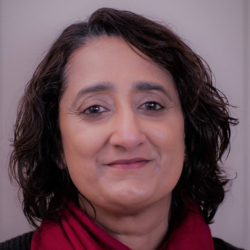
Fatima Hassan is a human rights lawyer and social justice activist and the founder of the Health Justice Initiative (HJI). She is the recipient of the 2022 Calgary Peace Prize and is a 2023 Echoing Green Fellow.
She has dedicated her professional life to defending and promoting human rights in South Africa, especially in the field of HIV/AIDS. She has worked as a Ministerial Advisor, and in philanthropy as well as the not-for-profit sector. She has served on several NFP boards and is the recipient of several awards, and often writes for local and international media publications. She currently serves on the Advisory Group for Resolve to Save Lives.
Dr. Biraj Man Karmacharya, MBBS, MS, MPH, PhD
Administrative Director and the Director of Public Health/Community Programs
Associate Professor, Department of Public Health
Dhulikhel Hospital/Kathmandu University School of Medical Sciences
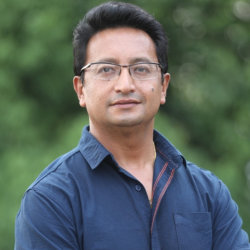
Biraj Man Karmacharya is the Administrative Director and the Director of Public Health/Community Programs at Dhulikhel Hospital (DH) and Associate Professor at the Department of Public Health at Kathmandu University School of Medical Sciences (KUSMS).
He obtained MBBS (2003) from Kathmandu University; MS (Tropical Medicine, 2006) from Mahidol University, Thailand; PhD (Epidemiology, 2015) as a Fulbright Science and Technology awardee, and MPH (Global Health, 2017) from the University of Washington in Seattle, USA. He was also the founding co-director of Nepal Studies Initiative at the Jackson School of International Studies at University of Washington.
He founded and has been leading the Department of Community Programs/Public Health at DH since 2006, through which he is engaged in developing and setting up innovative community-based health and integrated health and development programs in Nepal. He has also been instrumental in advancing public health training and research in Nepal leading the pioneering programs MScPH (Epidemiology and Global Health) and lately the PhD Program in Public Health at KUSMS. His research interests span across non-communicable diseases, climate change and health, and health systems and policies.